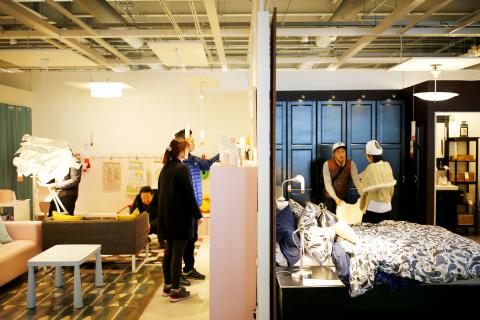IKEA was onto something when it opened its first South Korean store, its largest anywhere, in late 2014.
Home furnishing chains are a bright spot in a sluggish South Korean economy, tapping demand from the rising share of people who are living alone and spending more to make their dwellings attractive and comfortable.
Local market leader Hanssem Co Ltd, with sales of more than US$1 billion in 2014, saw a 31 percent increase in revenue for the first nine months of last year and a doubling in its share price for the year as it opened 27 of its larger stores in 2014 and last year. Shinsegae Co Ltd’s Jaju chain opened 10 stores last year, bringing its total to 149.

Photo: Reuters
Swedish giant IKEA, whose single store on the outskirts of Seoul generated US$260 million in its first year, expects to spend 1.2 trillion won (US$997 million) to open five more South Korea stores by 2020 — one more than earlier planned.
South Korea is following a path seen in the US and Japan, with people spending more on home decoration as per-capita GDP rises, analysts say.
“Four or five years ago, people thought home decorating was only for rich people,” said Ock Soo, 32, who founded Webzine Rooomers and conducts decorating classes attended mostly by singles.
“Now home decoration is for everyone, as more people are living alone and for longer periods,” she said.
Home decorating shows known as “jipbang” have been proliferating on TV, including “Old House, New House” and “My Room’s Dignity,” both of which debuted in December last year.
A fast-graying South Korean population and heavy household debt, at 1.7 times annual disposable income, make property investment less attractive, prompting homeowners and renters to spend instead on making their existing dwellings more liveable. South Korea’s working-age population is set to peak this year.
“People no longer see houses as an investment, but as an object of utilization,” said Lee Gwang-soo, an analyst at Mirae Asset Securities. “People start decorating their homes because they now have to ‘live’ in them.”
Last year, South Koreans spent 12 trillion won on home interior decoration, including floors, walls, doors, kitchen and bathroom fixtures and labor, up from about 9 trillion won in 2014 and forecast to grow to 27 trillion won by next year, according to Mirae Asset Securities.
Those figures exclude furniture and off-the-shelf items, which make up the bulk of sales at retailers like IKEA and H&M Hennes & Mauritz AB’s H&M Home, and came despite economic growth that slowed to 2.6 percent last year, from 3.3 percent.
Korea Investment & Securities estimates the domestic furniture market is worth about 8 trillion won, with kitchen items counting for another 3 trillion to 4 trillion won.
The share of single-person households in the country rose to an estimated 27 percent last year from 20 percent in 2005, according to Statistics Korea, and is forecast to reach 31 percent in 2025 as younger people delay getting married and having children in the fastest-ageing industrialized country.
People living on their own spend a larger share of their incomes on consumption, including decoration.

Quanta Computer Inc (廣達) chairman Barry Lam (林百里) is expected to share his views about the artificial intelligence (AI) industry’s prospects during his speech at the company’s 37th anniversary ceremony, as AI servers have become a new growth engine for the equipment manufacturing service provider. Lam’s speech is much anticipated, as Quanta has risen as one of the world’s major AI server suppliers. The company reported a 30 percent year-on-year growth in consolidated revenue to NT$1.41 trillion (US$43.35 billion) last year, thanks to fast-growing demand for servers, especially those with AI capabilities. The company told investors in November last year that

United Microelectronics Corp (UMC, 聯電) forecast that its wafer shipments this quarter would grow up to 7 percent sequentially and the factory utilization rate would rise to 75 percent, indicating that customers did not alter their ordering behavior due to the US President Donald Trump’s capricious US tariff policies. However, the uncertainty about US tariffs has weighed on the chipmaker’s business visibility for the second half of this year, UMC chief financial officer Liu Chi-tung (劉啟東) said at an online earnings conference yesterday. “Although the escalating trade tensions and global tariff policies have increased uncertainty in the semiconductor industry, we have not

Intel Corp has named Tasha Chuang (莊蓓瑜) to lead Intel Taiwan in a bid to reinforce relations between the company and its Taiwanese partners. The appointment of Chuang as general manager for Intel Taiwan takes effect on Thursday, the firm said in a statement yesterday. Chuang is to lead her team in Taiwan to pursue product development and sales growth in an effort to reinforce the company’s ties with its partners and clients, Intel said. Chuang was previously in charge of managing Intel’s ties with leading Taiwanese PC brand Asustek Computer Inc (華碩), which included helping Asustek strengthen its global businesses, the company

Power supply and electronic components maker Delta Electronics Inc (台達電) yesterday said it plans to ship its new 1 megawatt charging systems for electric trucks and buses in the first half of next year at the earliest. The new charging piles, which deliver up to 1 megawatt of charging power, are designed for heavy-duty electric vehicles, and support a maximum current of 1,500 amperes and output of 1,250 volts, Delta said in a news release. “If everything goes smoothly, we could begin shipping those new charging systems as early as in the first half of next year,” a company official said. The new